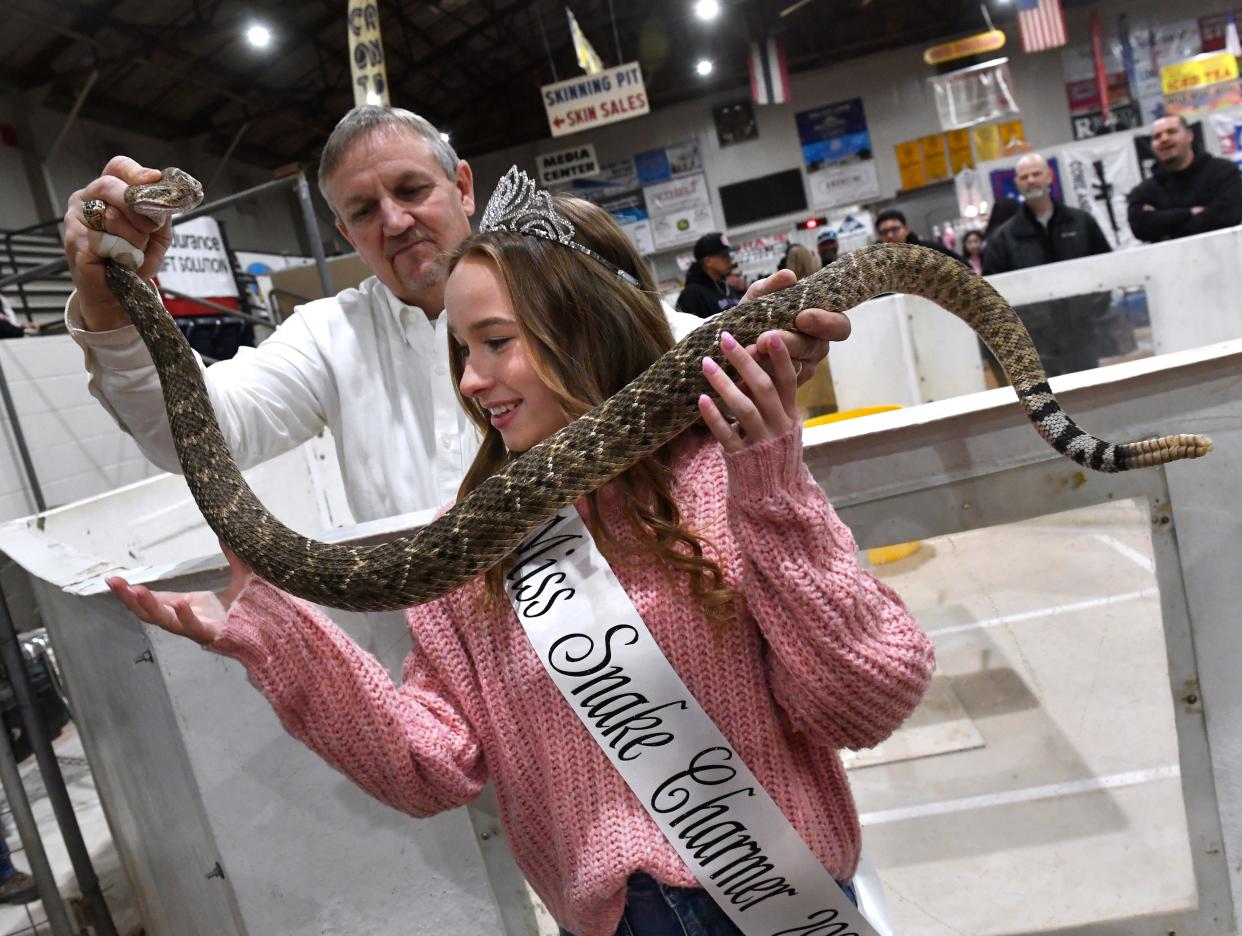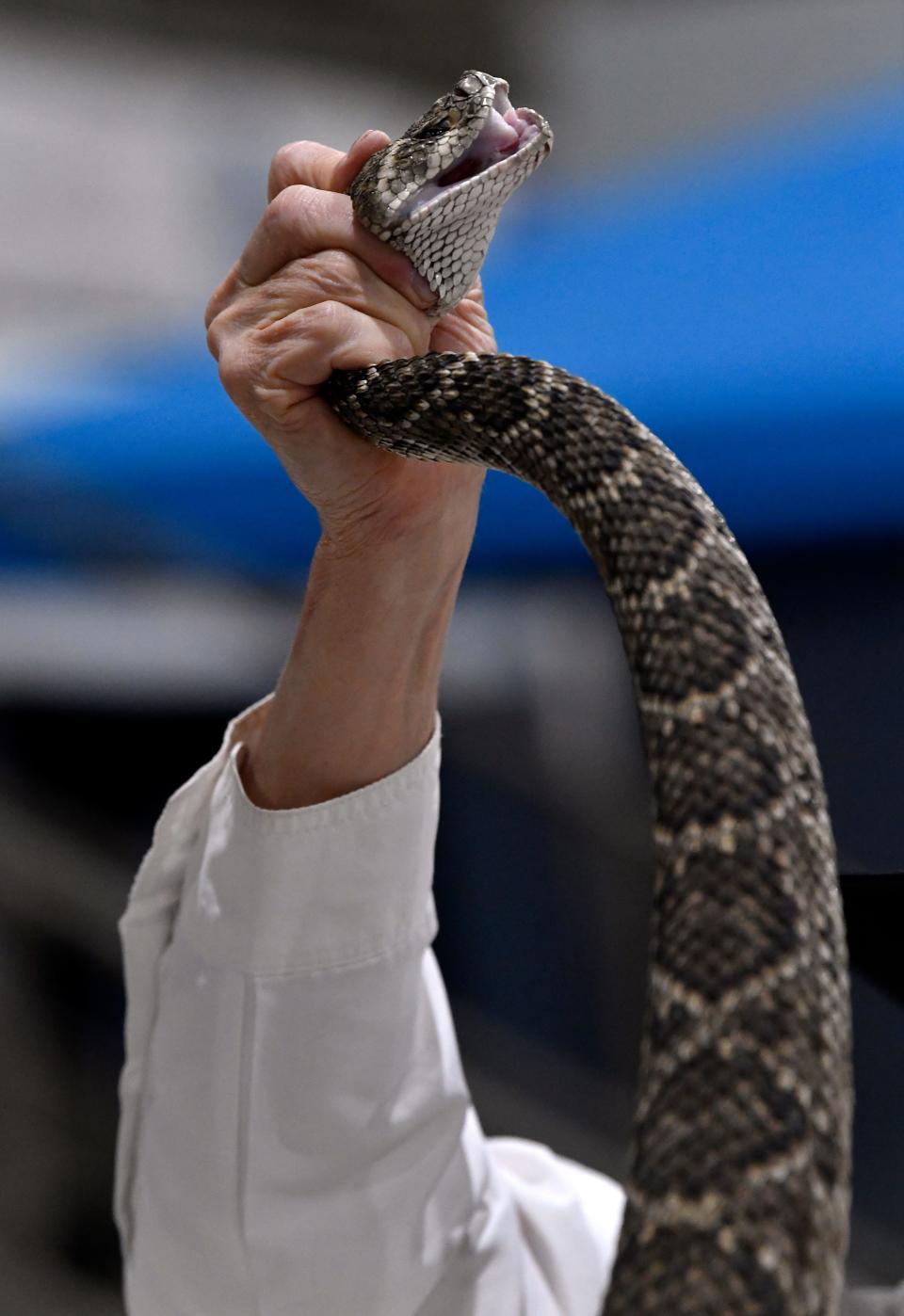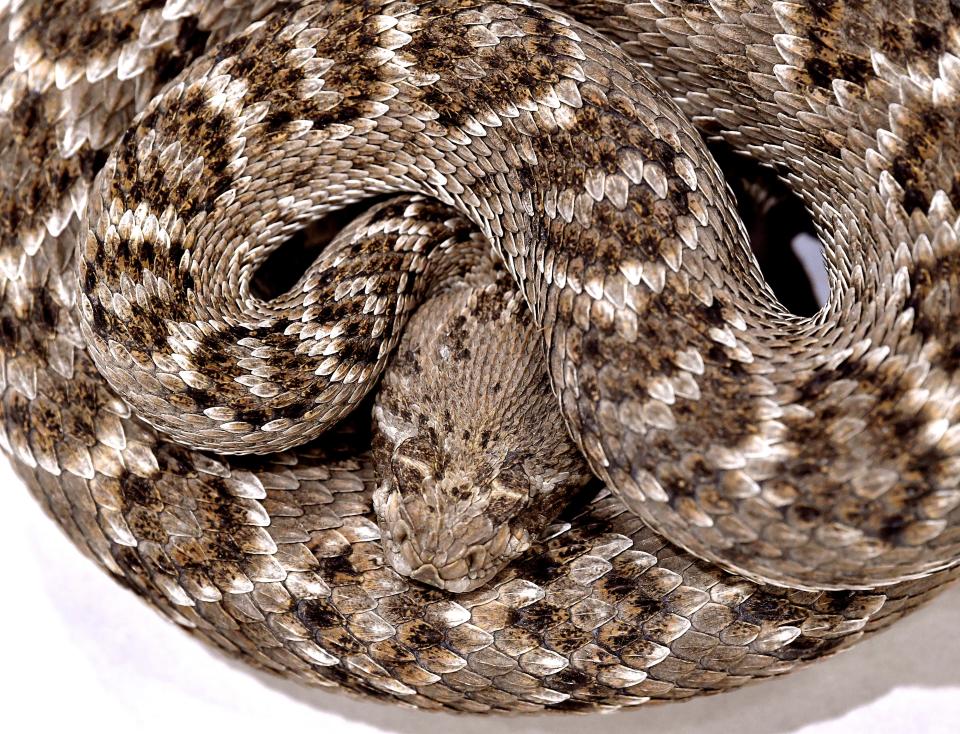Sweetwater's Rattlesnake Roundup is this week. Snake advocates are pushing for change

Sweetwater, Texas — For many Sweetwater locals, the Rattlesnake Roundup is a festive event that brings humans and wildlife together while also providing a much-desired financial safety net for their community. But some observing from outside the West Texas bubble say the belief that the annual event is rooted in education and safety is delusion at best.
Now, a snake advocacy group, a university class and an army of children have banded together in attempt to put an end to what they say is the inhumane mass slaughter of rattlesnakes. Instead, they'd like to see the event transform into an educational opportunity that celebrates the creatures.
"We're not trying to shut down the event or make some cultural change within the community," said professor Emily Taylor, who is teaching her honors class at California Polytechnic State University about message framing and grassroots activism. "But there's no reason why we can't transition into celebrating wildlife instead of butchering them."
A case for snakes
For several weeks leading up to this year's round-up, nearly 1,000 households in Sweetwater received a handwritten letter or card from children across the nation as part of the campaign between Taylor's honors seminar — called Team Rattlesnake Rebrand — and the Advocates for Snake Preservation nonprofit.
“Rattlesnakes are really shy creatures,” wrote Cielo, an 11-year-old student at Aldo Leopold Middle School in Silver City, New Mexico. “Their rattle sound is not one of ferociousness but one of screaming.”
Chris Soles, the public relations officer for the Sweetwater Jaycees — the non-profit group that organizes the roundup — says protests have grown in size over the years, just as the event has.
But that's not going to stop the Jaycees from continuing with the event, he says.
"They've got their opinion, but we're gonna do what we do," said Soles, who has hunted rattlesnakes with the group for 50 years. "No matter what they do, or say, we're gonna do what we have to do to put on a successful round-up."

A highly anticipated event
Headed into its 65th year, the annual event that's claimed billing as the World's Largest Rattlesnake Roundup brings 40,000-some visitors to Sweetwater, a 10,500-population town that sits along Interstate 20 about halfway between Lubbock and Fort Worth.
Technically, the first hunt was actually 66 years ago, Soles says, but it wasn't the city-sanctioned event it's become today.
"At the time, Sweetwater was basically overrun (with rattlesnakes), and a lot of people, and a lot of livestock, just different things, were getting bitten by rattlesnakes — and it was just really severe," Soles said. "So, the next year the Sweetwater Jaycees said, 'Hey, we can do something with this and do something for our community,' and that's how the roundup became, and we've done it every year since."
Unlike many events scheduled during the pandemic's earliest days, Soles points out the roundup is unique in the fact that its schedule — held during the second weekend of March each year — worked in its favor, allowing the annual event to continue without a gap year as others had faced.
In 2020, the event took place just six days before Texas Gov. Greg Abbott declared a stay-at-home order on March 19, and the 2021 event occurred just two days after Abbott reopened the state on March 10 eliminating the statewide mask mandate and allowing businesses to operate at full capacity.
Soles joked that, during its first pandemic year, the roundup was "probably the largest event in the country" that weekend.
Since its inception in 1958, the roundup slowly evolved into a massive festival — at least for a town of Sweetwater's size — that's highly anticipated by locals and offers a range of activities beginning with a parade and pageant and concluding with various cookoffs and contests. There's also a carnival, flea market and gun and knife show.
Each year, hunters bring between 3,500 to 4,000 pounds of rattlesnakes that are weighed, measured, sexed as male or female and milked for venom. The snakes are then used for what Soles describes as educational demonstrations before they're killed and skinned, and their meat is rolled in batter and deep fried for sale (along with snake heads and skins).
"It's not that we like to kill the rattlesnakes," Soles said. "But we do it because it promotes safety. Everything we do, is to teach people what to do if they encounter a rattlesnake and just teach people about rattlesnakes in general."
Throughout the weekend, the Jaycees host many contests, including the longest beard and biggest snake — which takes between six or seven organizers to stretch out, a Jaycee member previously told the Abilene Reporter News — and a snake-eating competition for who can consume the most fried rattlesnake in the shortest time.
Soles adds that the large-scale event brings a much-appreciated boost of about $8.3 million to the local economy, and a portion of the proceeds benefit organizations across the community.
"We give back to our community; we give back to kids," Soles said. "That's the whole reason we do this event."

'Never ecologically justified'
While the roundup serves an inarguably critical role for the economy of Sweetwater, snake advocates say they see eye-to-eye with the locals when it comes to the city's desire for the event as an economic driver, as well as the roundup's potential for educational purposes. They'd just rather see a better ending for the thousands upon thousands of reptiles that find their demise inside the Nolan County Coliseum each year.
"We recognize that this is the major economic event for Sweetwater — and it should continue to be so," Cal. Poly. Professor Taylor said. "But there's no reason why we can't transition into celebrating wildlife instead of butchering them."
She's calling for the Jaycees to switch to a no-kill event that would offer the same activities — minus the thousands of rattlesnake deaths.
While Soles says they could consider the plea for a no-kill roundup, he believes it would have greater impact as the portion of the proceeds from meat and part sales are donated to local nonprofits and youth sports organizations.
"If I make less money, then I'm not able to give as much money to those agencies and groups and kids alike," Soles said. He adds that even if they did follow suit, the event would still result in their deaths since a large buyer would take them and kill them off anyway.
But Taylor says there's no need to capture thousands of rattlesnakes at all, and instead, proposes the program utilize a handful, which they would later release in a safe place, to focus on proactive education that would reduce human-rattlesnake contact and teach preventative measures when in contact.
Last year, similar advocacy by the Center for Biological Diversity and other groups prompted community leaders to revamp the Whigham Rattlesnake Roundup in Whigham, Georgia, into a wildlife-friendly festival.
Taylor says she is not vegan or vegetarian, and the harvest of meat isn't the reason she's taken partial lead in this campaign. For her, it's about the inhumane treatment of animals and the state's inexistent regulations over the hunt and production of rattlesnake meat.
"I'm a total proponent of hunting; hunting rattlesnakes for meat would be perfectly fine if it was regulated just like every other hunting animal. It's not about sustainable harvest of meat, which to me, is perfectly fine," Taylor said. "It's an issue of unregulated and unethical and inhumane treatment of animals — all for entertainment."
She also says she believes the hunt and capture of rattlesnakes defeats the organization's purpose of promoting safety.
All snakes, including rattlesnakes, do not attack humans without cause, but will defend themselves if they feel threatened, she says, so individuals are more likely to get hurt by hunting rattlesnakes than if they were just taking proactive measures that would better protect them and keep rattlesnakes away.
Last year, 60-year-old Eugene De Leon Sr. of the Snake Busters Snake Handlers in Freer died after a snake bit him during a performance at their annual roundup, according to the Corpus Christi Caller Times.
"For me, the problem is also the smoke and mirrors and gaslighting about the supposed education that occurs, which is really not true," Taylor said. "Kids are doing this, too. And that's a really unethical way to celebrate life and wildlife around kids. Even though a lot of people at the roundup do take precautions and keep themselves safe from snakes, the way that they demonstrate handling the snakes is a bad example for kids because kids are known to copycat."
Echoing a similar sentiment, Texas Tech Professor Gad Perry, who teaches conservation biology and leads the herpetology department, says snake bites mostly occur when young males try to collect snakes, as is the case with the rattlesnake roundup.
He says more people die from lightning strikes each year than from all snake bites combined, and data from the Centers for Disease Control and Prevention confirms his claim. On average 28 people died from lightning strikes each year between 2006 and 2021, while only five died from venomous snake bites.
"It's a matter of perception more than objective reality," said Perry, who is also a section editor of Reptiles and Amphibians. "Most of these guys couldn't do you any damage even if they wanted — even rattlesnakes, if given a choice."
Akin to wild elephants that are born with smaller or no tusks, Perry says he's heard claims that the rattlesnakes in West Texas are now adapting to their threat of the annual hunt, and more and more are born without rattles — making them an even greater threat to humans and further deviating from the Jaycees' purpose of promoting safety.
As an advocate for snakes and other reptiles, Perry says the need to hunt rattlesnakes was never necessary, and its not sustainable. It's also not backed by science, he adds, since most hunts occur on private land where access for scientists is difficult.
Though Soles says he hunts the same dens every year, and they continue to be abundant, proving the community's need to reduce their populations, Perry says most hunters are having to go further in distance each year to capture them.
"They are not overpopulated, and they never were," Perry said. "They're ecologically present at levels inconvenient for people. This has always had to do solely with human desire. Nothing has changed.
"Ecologically, this was never justified."
This article originally appeared on Lubbock Avalanche-Journal: Sweetwater Rattlesnake Roundup this week, snake advocates push change

